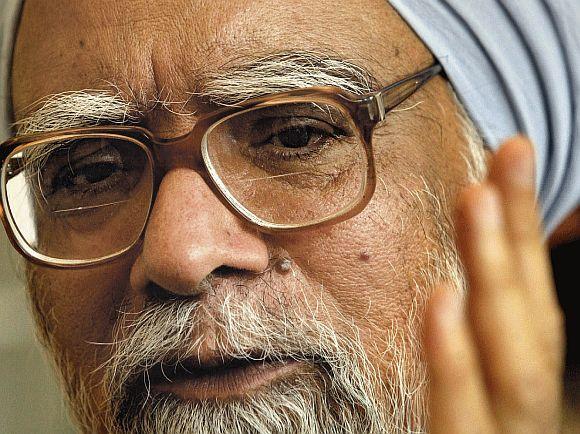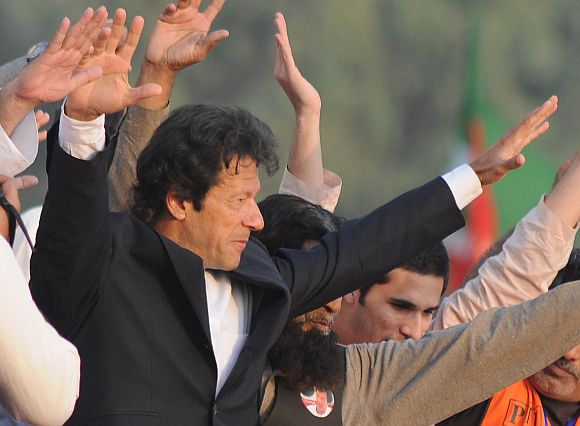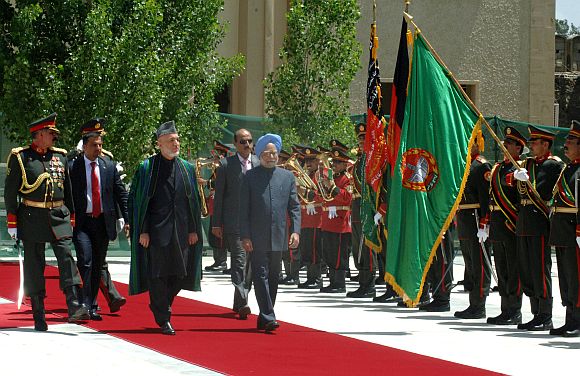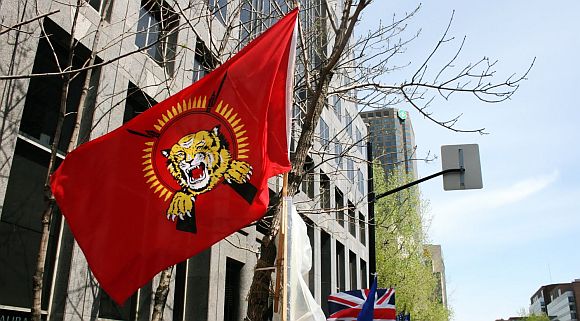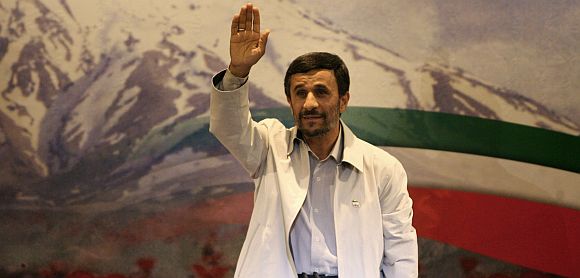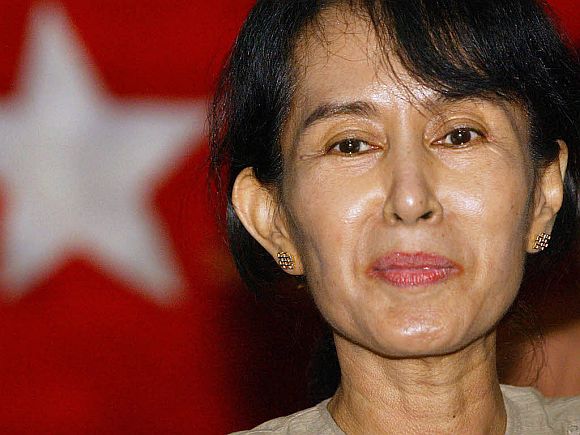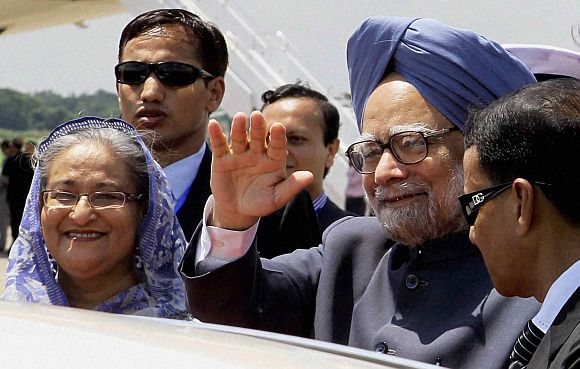 | « Back to article | Print this article |
India looks east, but with a firm eye on South Asia
India can take heart that its Look East policy, after an initial period of fits and starts, has gone well, with membership to important multi-regional forums and the world respecting it for the way it has come out of its shell, but that does not mean it has taken its eyes off the immediate neighbourhood whose developments pack the punch to derail its hard-earned progress.
As Prime Minister Manmohan Singh returned from Bali and Singapore, where he demonstrated that the lumbering elephant also packs nimble steps, senior government sources in New Delhi expanded on what is happening around India's backyard.
Pakistan: Memo of misunderstanding
Joined at the hip siblings India and Pakistan continue to share an uneven relationship despite all the attempts at normalisation of ties between them. While India will go ahead with the process while keeping in mind the history, three developments to our western border are important, said top government sources in New Delhi.
One, the incident of the missive that was sent to Mansoor Ijaz in London, expressing the fear that a coup against Zardari was in the offing, to be handed over to Adm Mike Mullen through an intermediary. The unsigned memo had promised to replace Pakistan's security apparatus with favourable people for the US's help.
A stung Pakistan Army deputed an ISI official to confront Ijaz, "none other than the director-general of ISI," said the sources, "which makes the whole incident very interesting." Ijaz not only confirmed the memo he had outed in a newspaper column but also said that Pakistan's ambassador to the US Hussain Haqqani had approved it and said that it had Zardari's approval. Haqqani promptly resigned as ambassador.
Two, the army has so far not found the "last link" to Zardari in the incident, the sources said, but that doesn't mean things are hunky-dory.
Click on NEXT to read further...
Imran Khan pads up
Three, given the above backdrop, over the last few weeks cricketer-turned-politician Imran Khan is being steadily built up, said the sources.
But times have changed, and a military coup is no more a viable option today and runs its own risks. "It makes so much more sense to put your own man in the job."
Unlike his cricketing glory days, Imran Khan has so far not been able to translate the mass adulation for him into political support but over the last few weeks he seems to have caught a tail wind.
"The old Musharraf hands are backing him," believe top sources in the Indian government, as are Shah Mahmood Qureshi and many Pakistan Muslim League members. But the risk here is for the democratic structure. "You can't sideline the two main parties in the country, which could lead to a fresh set of troubles," they warned.
For India that would mean another round of instability in a nation that is trying to come to terms with itself. "But is instability new? We will continue as before, we will talk to the government of the day, we will do business wherever we can, but the real test is the outcome," the sources said. "There has been so much inconsistency from them, but we have been consistent in dealing with them."
The fact of the matter is, they said, India has been worried about what will come out of Pakistan for a long time. "They are stuck in their own complications, and we are dealing with an impossible neighbour. They have thrown everything they have at us, and we have dealt with all of that."
But the problem, the sources said, is that one is not dealing with just one Pakistan but many Pakistans. "The closest they came to being one Pakistan was under Musharraf. Look at where they are and where we are. For a long time we were being boxed into South Asia and Kashmir was an issue that was raised at world forums to beat us with. Today do you see Kashmir being raised anywhere?"
Net verdict: We are sorry for what they are going through, but they will have to handle this themselves.
Click on NEXT to go further...
Alert in Afghanistan
Pakistan, commentators often point out, has made a fine art of running with the hounds and hunting with the hares in the context of its involvement in the war on terror while doing little to shut down the safe havens on its territory for extremist elements. Periodically mouthing platitudes about cracking down on terror groups, it has kept up the pretence very well.
But what Indian government sources find worrying is that of late, even this lip service has dried up. "We detect a hardening of stance on their part vis a vis Afghanistan, which is not a good thing. It could be a result of their internal conditions, we don't know, but we are watching the developments."
Treating Afghanistan as its backyard, Pakistan has often accused India, which has an array of assistance projects in the former, of meddling in its affairs and involving itself in Pakistan to counter its influence in the region. While what the future holds is unclear, the government says they are prepared to deal with it.
Click on NEXT to read further...
The Tiger is dead, long live the Tiger
More than two years after the Liberation Tigers of Tamil Eelam was decimated by the Sri Lankan army and its leader V Prabhakaran eliminated, the Indian government has said there have been intelligence reports of the outfit trying to regroup.
"We have been receiving scattered reports of the LTTE trying to regroup, and obviously Sri Lanka is worried over them."
The fact is, while the LTTE may have been neutralised, its network of sympathisers and financiers remains intact, especially among the Tamil expatriate community.
"The remnants of all this support are still around, there are a lot of sympathisers, but so far they are too scattered to pose a live threat," said the government sources in New Delhi. "They are too busy fighting each other now."
While Sri Lanka has won the military encounter, it is yet to win the hearts of the island's Tamil population. And unless it does this, there will always be a fear of the LTTE exploiting the dissatisfaction among the people.
Click on NEXT to read further...
Iran is where the nuclear dome is
More than with any other country, it is with Iran that India has demonstrated the most delicate footwork. It may have voted with the majority on the IAEA report on Iran's nuclear plans, but it refuses to go along with the West in condemning Iran as evidenced by its abstention on the UN General Assembly vote "deploring" the alleged Iranian plot to kill the Saudi ambassador to the US Adel al Jubeir.
"Who are we to judge?" said the sources, adding, "Nothing has really changed for us. We have always said that there should not be a new nuclear power in a region fraught with tension and we maintain that position. At the same time, we also believe Iran has a right to pursue peaceful nuclear energy. We voted for the IAEA resolution, but we believe that yelling at them, like the West is doing, won't help matters."
At the same time, India believes that Iran should be more open about its plans. "They must clarify to the international community what they are doing, the legitimate concerns should be addressed through the IAEA" and not any other form.
"In that sense, nothing has really changed for us."
Click on NEXT to read further...
Myanmar: But we said so
As Myanmar gets ready to take over as head of an international forum (Asean) for the first time, there are other things happening that have justified India's engagement in the face of criticism with the military junta in an effort to goad it towards the democratic process, said Indian government sources, crowing, "But we said so!"
US Secretary of state Hillary Clinton is scheduled to visit the country -- which shares a border longer than Pakistan with India and which is our first geographical touchpoint to Asean -- next month, dissident leader Aung San Suu Kyi has said she will stand for Parliament, the monks have emerged as a big force, and Myanmar's speaker is visiting India in December in a bid to better understand the democratic process, said the sources.
"They are slowly changing their sytem, but it will have to be within their comfort zone," they said, and we can't hurry them along. "Remember, they have 56 ethnicities in the country, and they don't want to do anything to upset their internal systems."
The message from India to Myanmar as it slowly emerges from the cocoon of international isolation is: We will help however we can.
Click on NEXT to read further...
Bangladesh: Teesta waters for all
West Bengal Chief Minister Mamata Banerjee may have put a spoke in India's growing relationship with Bangladesh when she scuttled the Teesta water-sharing treaty that was to be signed during Prime Minister Singh's recent visit to that country, but things are moving forward.
Since then Banerjee has told the visiting Bangladesh finance minister Dipu Moni that she wants to conclude the treaty, and Prime Minister Sheikh Hasina may visit Kolkata to deliver the Calcutta University's convocation address.
"Mamata's concerns are genuine, she doesn't want to sacrifice North Bengal's interests while at the same wanting to help Bangladesh, and things are being worked out on how best everyone can be satisfied with the treaty," said the sources.
And once that happens, the last remaining kink in ties between the two neighbours will have been ironed out.
Click on NEXT to read further...
China: Dragon's embrace
A government official recalled how even 10 years ago China was contemptuous of India, its lack of development, its noisy democracy. Today, he says, China has realised that India has come out of its shell and, while problems remain, it is the not the same country anymore. "A lot of it stemmed from 1962, when we just rolled over to die when they came in."
What made the difference, he believes, was the nuclear capability India acquired in 1998. "You can disagree with AB Vajpayeeji's politics or party, but you can't deny him the credit for making the world sit up and take notice of India with this one single act," he says.
Said another official: "Even 10 years ago we were boxed into the South Asia paradigm, and Chin was happy that was our pond. And then, combined with the nuclear weapons, our economy boomed, and there was nothing China could do but accept our new status grudgingly."
"Of course China is not happy with our Look East policy, but then are we happy with its involvement in PoK? In Pakistan? It is all around us but we have learnt to live with it, and China too will come around to living with us," the sources said. "But if you ask us, are we deliberately provoking China? Then the answer is No. But we also refuse to be tied down to South Asia, as one of the world's biggest economies we are natural players on the global stage."
Gone, in fact, is the traditional pussyfooting of India over thorny issues. So maritime security, an euphemism really for right of passage in South China Sea, which China considers its lake, was brought up in multilateral forum in Bali despite China's preference for dealing with the issue on a bilateral basis.
"You may find it contradictory, but remember today China is our second biggest trading partner, so economics helps keep the momentum between us. The border issue is there but the talks are progressing well, though there is no timeframe to its conclusion. A few years ago our engagement with China was only over the border, today our ties are multi-dimensional, so in that sense both the countries have learnt to compartmentalise things."
And as India acquires confidence in an increasingly inter-dependent world, compartmentalising relationships is something it has learnt to tweak to its advantage.
Click on MORE to read another feature...
